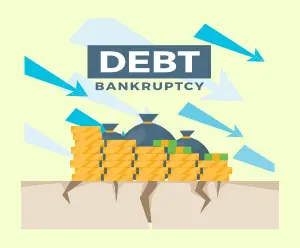
Understanding the IRS Substitute for Return
Click to ask Mike Ask Mike The Internal Revenue Service (IRS) Substitute for Return (SFR) is a term many taxpayers

Dealing with income tax debt can be an overwhelming and stressful experience for many individuals. As financial challenges arise, some people find themselves unable to meet their tax obligations, leading to mounting debt and potential legal consequences. One option that individuals facing this predicament may consider is bankruptcy. In this article, we’ll explore how bankruptcy can be a viable solution to wipe out income tax debt, offering a fresh start and much-needed financial relief.
Understanding Income Tax Debt:
Income tax debt occurs when individuals owe the government money due to unpaid income taxes. This can result from various reasons, such as unforeseen financial hardships, job loss, or simply miscalculating tax liabilities. Unlike other debts, income tax debt is often subject to strict penalties and interest rates, making it even more challenging for individuals to manage and pay off.
Types of Income Tax Debt Eligible for Bankruptcy:
Not all types of income tax debt can be discharged through bankruptcy, but certain criteria must be met for a successful resolution. To qualify for discharge, the income tax debt must meet the following conditions:
Types of Bankruptcy:
There are different types of bankruptcy, with Chapter 7 and Chapter 13 being the most common for individuals seeking relief from income tax debt.
Benefits of Bankruptcy for Income Tax Debt:
While bankruptcy can offer a lifeline for individuals drowning in income tax debt, it is essential to approach the decision with careful consideration and seek professional advice. Consulting with a qualified bankruptcy attorney can help individuals understand their options, navigate the complex legal process, and make informed decisions that align with their financial goals.
In conclusion, bankruptcy can indeed be a powerful tool for wiping out income tax debt, providing individuals with the opportunity for a fresh financial start. However, it is crucial to meet the specific eligibility criteria and carefully weigh the consequences before pursuing this path.
You can now ask our AI assistant any questions you have about your tax debt or any tax-related issues. Whether you’re unsure about payment plans, need clarification on penalties, or want information on how to resolve your tax situation. Our AI is ready to assist you with all your tax-related concerns.

By interacting with our AI assistance, you agree to our terms & conditions. Enjoy our AI Tax Assistant responsibly.
Ask me any questions...
Related Posts

Click to ask Mike Ask Mike The Internal Revenue Service (IRS) Substitute for Return (SFR) is a term many taxpayers

Click to ask Mike Ask Mike The Internal Revenue Service (IRS) Substitute for Return (SFR) is a term many taxpayers

Click to ask Mike Ask Mike The Internal Revenue Service typically operates within a 10-year window, commencing from the

Click to ask Mike Ask Mike The Internal Revenue Service (IRS) operates within specific timeframes dictated by statutes of limitations

Click to ask Mike Ask Mike understanding the ins and outs of the 10-year statute of limitations (SOL) is essential.
Recent Posts

Click to ask Mike Ask Mike The Internal Revenue Service (IRS) Substitute for Return (SFR) is a term many taxpayers

Click to ask Mike Ask Mike The Internal Revenue Service (IRS) Substitute for Return (SFR) is a term many taxpayers

Click to ask Mike Ask Mike The Internal Revenue Service typically operates within a 10-year window, commencing from the

Click to ask Mike Ask Mike The Internal Revenue Service (IRS) operates within specific timeframes dictated by statutes of limitations

Click to ask Mike Ask Mike understanding the ins and outs of the 10-year statute of limitations (SOL) is essential.
Disclaimer: This is educational content, not legal, accounting, or tax advice.
This is a tax debt resource website, not to be used in lieu of a tax attorney or for legal advice. All information, Ai chat responses, articles, materials, and content are intended to inform users on a variety of tax topics. In no way is it intended to be construed as accounting, legal, tax, other services or advice. This site is not intended to be used to avoid tax penalties or tax debt that may be imposed by law. Terms and Conditions. Your use of this site constitutes acceptance of the following terms and conditions.
This is a tax debt resource website, not to be used in lieu of a tax attorney or for legal advice. All information, Ai chat responses, articles, materials, and content are intended to inform users on a variety of tax topics. In no way is it intended to be construed as accounting, legal, tax, other services or advice. This site is not intended to be used to avoid tax penalties or tax debt that may be imposed by law. Terms and Conditions. Your use of this site constitutes acceptance of the following terms and conditions.
© 2023 · Tax Debt Monster, Inc. All rights reserved

For all Tax Professionals that would like to partner up with us. By partnering with us, you’ll help us connect and make a positive impact in the tax community. Partner up with us and receive a complimentary Ai Tax Sidekick to help support your clients at no cost! Click here if you’re interested in our Partner-Up program

By interacting with our AI assistance, you agree to our terms & conditions. Enjoy our AI Tax Assistant responsibly.
How may I help you with your tax issue?